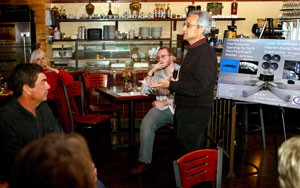Just as European settlers brought seeds to grow crops in America, humankind will one day take crops to the moon, Mars and beyond.
So believes Gene Giacomelli, a professor of agricultural and biosystems engineering, and director of the UA’s Controlled Environment Agriculture Program.
Giacomelli discussed his research and growing vegetable crops in extreme and remote environments such as Antarctica, Tucson and – one day – the moon during Monday’s “”Science Café,”” a public event for the community to learn and discuss science topics presented by UA scientists.
The “”Science Café”” is held at Enoteca Pizzeria and Wine Bar, 58 W. Congress St., once a month.
“”You can grow any crop anywhere, anytime,”” Giacomelli said, who oversees crops currently growing in Tucson and Antarctica.
Through growth chambers and hydroponics, these crops are yielding 10 times the production of normal crops, he said.
He emphasized that technology will create efficient crop production in an environment where nature largely discourages growth.
“”We can feed the world, save the world and create new worlds,”” he said.
While growing controlled-environment crops is costlier – $50 per pound of vegetable yielded – and uses 10 to 100 times more energy than conventional production methods, ultimately it is a priceless consideration for future space explorations, Giacomelli said.
For scientists to stay at a research location, whether Antarctica or the moon, we must provide them a source of food, he said.
Growth chambers in the arid deserts of Arizona are currently producing 600,000 pounds of tomatoes a day, he said. One facility in Wilcox spans 318 acres.
There are benefits to the technology besides creating food in new locations and eliminating the need for transportation, he said. The controlled-environment crops are more dependable and predictable than standard crops with factors like weather, bugs and parasites being less of a threat and easier to control indoors.
In addition, he said, the technology involved can be used to filter water, remove toxins from soil and reduce carbon dioxide from the environment.
In 2005, NASA announced plans to return to the moon by 2020. Giacomelli said he expects NASA to use a “”picnic-basket technique”” at first, carrying with them the necessary food and water.
But in time, as humankind continues to explore the beyond, it will become a necessity to take food production with us, he said.
People who attended the event got to sample tomatoes grown in the chamber and topped their pizza with the tomatoes.









